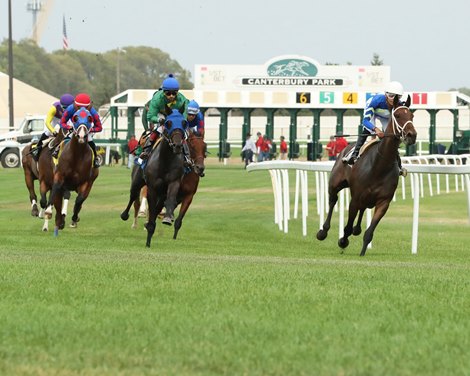The Minnesota Racing Commission voted April 1 to approve historical horse racing at Canterbury Park and Running Aces, a move commissioners hope can help reinvigorate the horse racing industry in the state.
According to the Minneapolis Star Tribune, the MRC was not expected to decide at Monday’s meeting, but after more than 3 1/2 hours of discussion, including emotional testimony from Minnesota horse owners and breeders worried about the survival of their sport, it voted 5-1 to approve HHR, effective May 21.
“We are at a critical crossroads,” commissioner Raymond Dehn told the newspaper. “There is a lot at stake.”
Canterbury Park believes this is a step in the right direction, one that leads to conversations between all of the parties with a vested interest in the outcome. Canterbury Park media relations manager Jeff Maday said the marketplace “is big enough” to benefit the tracks, the Native American tribes, and the charitable gaming sides of the equation. But it also signals the desire for the racetracks to be part of the gaming conversation in Minnesota.
“I think it shows that the commission…understands the importance of finding options to keep racing healthy and Minnesota,” said Maday.
Sign up for BloodHorse Daily
The report notes that 500 HHR terminals would be allowed at each track, with a track-commissioned study showing HHR would “generate $5.9 million for purses, plus money for the state breeders’ fund, retired racehorse programs and regulatory costs” in its second year.
“It certainly has created optimism amongst a number of people in the industry, but I think they also do need to realize that this is still not a certainty,” Maday said of the vote in favor of HHR.
The Minnesota Indian Gaming Association and the Shakopee Mdewakanton Sioux Community, which operates Mystic Lake Casino, both “spoke against the proposal and could pursue legal action to block HHR,” according to the Star Tribune.
Mystic Lake Casino and Canterbury had an arrangement in which the casino provided funding for purses in exchange for the track not pursuing additional gaming revenue streams such as slot machines.
In 2022, the final year of the agreement between Canterbury and Mystic Lake, $7.2 million of the $16 million in total purse money was provided by the casino. Last year, with the deal no longer in place, Canterbury’s total purse money dropped to $11 million.
Owner/breeder Dan Kjorsvik told BloodHorse magazine earlier this year that without the support of revenue that would come with sports betting, it would be a “nail in the coffin” for horse racing in the state.
Minnesota has seen a decline in purses, wagering, and foals. According to the Jockey Club’s State Fact Book, Minnesota has seen a decline in foal numbers every year since 2015.
The May 21 date is the day after the legislative session concludes, hoping the tribes and tracks can work on an agreement while the state considers sports betting bills.
Maday said he believes there will be legal challenges by the tribes on the racing commission’s authority, but also that the MRC wants to give the legislature a chance to “make this right.”
MIGA’s executive director Andy Platto told the paper that the vote was “an extreme violation of legislative authority.” He said that MIGA “will be looking at all available options” to stop the tracks from adding the games, which he described as ‘just like slot machines.’ “
According to the Star Tribune, the sports betting bills being considered would allow only the tribes to conduct sports betting. But the House bill would “give the tracks a $625,000 stipend to share, while the Senate bill would give them an amount capped at $3 million per year.”










Leave feedback about this